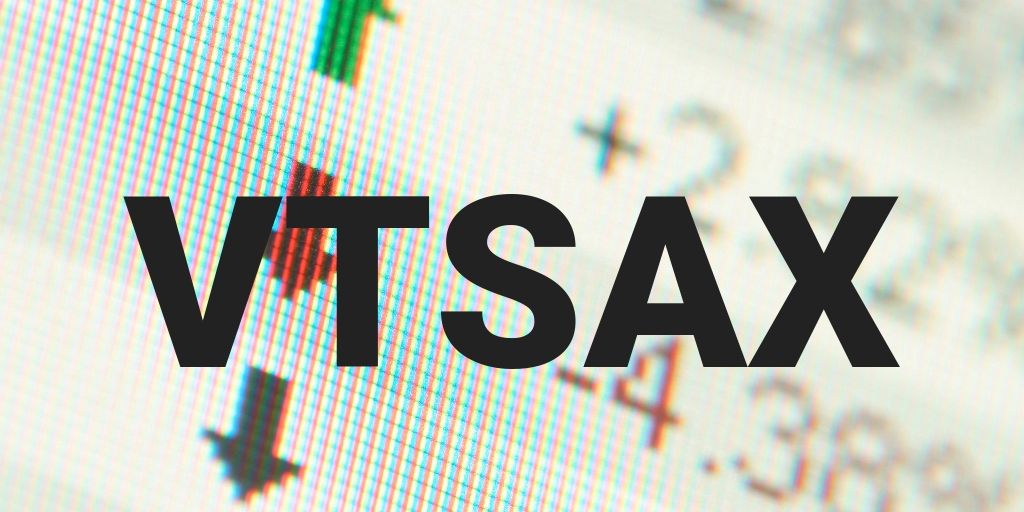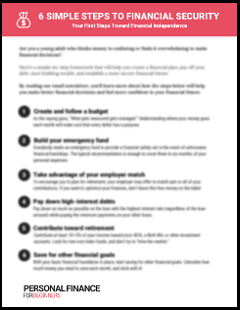If you’re just starting to take the first steps to investing, it’s only a matter of time until you encounter an acronym that you’re unfamiliar with: VTSAX.
Of course, for personal finance beginners, this is one of many acronyms that might confuse you.
When you come across words like VTSAX, ETF, and APR, you may wonder if the writer accidentally set their cup of coffee on the keyboard while writing their article (what do all of these words mean?!)
In this post, you’ll learn about the definition of VTSAX, what it takes to invest in VTSAX, and why many people consider the VTSAX mutual fund to be a good investment.
What is VTSAX?
VTSAX is an acronym that stands for “Vanguard Total Stock Market Index Fund Admiral Shares.” VTSAX is an index fund designed to track the performance of the entire United States stock market.
For a little more detail, let’s take a look at a summary of the VTSAX fund from Vanguard themselves:
Created in 1992, Vanguard Total Stock Market Index Fund is designed to provide investors with exposure to the entire U.S. equity market, including small-, mid-, and large-cap growth and value stocks. The fund’s key attributes are its low costs, broad diversification, and the potential for tax efficiency. Investors looking for a low-cost way to gain broad exposure to the U.S. stock market who are willing to accept the volatility that comes with stock market investing may wish to consider this fund as either a core equity holding or your only domestic stock fund.
What type of fund is VTSAX?
To fully understand VTSAX, it may be helpful to have definitions for both mutual funds and index funds.
A mutual fund is a portfolio of many different stocks you can purchase together.
An index fund is a mutual fund that’s created to reflect a larger market.
VTSAX is both a mutual fund and an index fund. Or put another way, VTSAX is a collection of many stocks (more on that later) that track the American stock market as a whole.
A Profile of the Vanguard Total Stock Market Index Fund
VTSAX is one of the largest index funds in the world. If you choose to invest in VTSAX, this means you certainly won’t be alone in carrying about its performance. It’s a popular choice likely owned by everyone from the new investor to those with generational wealth.
That being said, it’s important to learn more about the composition and historical performance before making your own personal decision.
How many stocks does VTSAX hold?
As of April 2019, VTSAX held 3607 stocks.
What stocks are held in the VTSAX fund?
The top 10 holdings in VTSAX are all generally considered to be household names. These companies make up nearly 20% of the fund’s total worth and include:
- Microsoft
- Apple
- Amazon
- Alphabet (Google)
- Berkshire Hathaway
- JP Morgan Chase
- Johnson & Johnson
- Exxon Mobil
- Visa
While the VTSAX provides a diversified portfolio over picking single stocks, there are a few industries that are most heavily present (you can probably guess which industries by using the list above). They are Technology (20.9%), Financial (19.5%), Consumer Services (13.7%) and Industrial (13.5%).
How has VTSAX performed?
Since its inception in 1992, VTSAX has performed with an average annual return of 9.74%. Since 2000, Admiral Shares have returned 6.87%.
The VTSAX fund is designed to closely reflect the performance of the entire stock market, and the results are generally a good representation of that.
Is VTSAX a good investment?
It can be difficult to label any individual stock or fund as a “good investment.”
After all, historical performance is no guarantee of future performance, and every individual brings different values, goals, and resources to the table when it comes to investing.
Many people are looking for what to invest in right now rather than developing a sound overall investment strategy.
There are a couple of big factors to consider when deciding what a good investment means to you – whether that’s investing in an index fund like VTSAX or something else:
- Costs: When you invest in the stock market, you’ll have to carefully review the terms to make sure you understand all of the expenses. You’ll end up paying some money to have it moved between funds and professionally managed. Become familiar with the fees, and resist the temptation to move your money often. Don’t give away your investment returns through costly fees.
- Diversification: Don’t put all of your eggs into one basket. Diversification, or distributing your investment across many different assets, allows you to manage your exposure to risk. Even if one of your stocks plummet (let’s say, due to a PR scandal, product announcement, or market shift), your portfolio is less affected as it’s supported by the performance of the other stocks you own.
Keep these two factors in mind can help you to avoid some of the most common investing mistakes.
Fortunately, index funds like VTSAX typically stack up well in both of these areas. If you’re looking for a hands-off, low-cost way to invest in the stock market, then investing in VTSAX is a good candidate to consider.
How much do I need to invest in VTSAX?
If you decide to invest in VTSAX, you may wonder how to buy your first shares from Vanguard. Currently, the minimum amount needed to invest in VTSAX is $3,000.
If this is your first time investing in the stock market, congratulations! Owning stocks is one of those financial behaviors that often demonstrates the difference between wealthy and “rich.”
If you don’t have $3,000 to start investing in VTSAX now, Vanguard also offers an ETF fund (VTI) composed of the same portfolio. You can invest in VTI starting at the price of just one share (just over $140 at the time of this writing).
VTSAX Review: A Conclusion
There you have it: an introductory review of VTSAX.
While this might just be one of many personal finance acronyms for you to learn about, hopefully you’ve learned something new about investing in the process.
Is VTSAX going to be a part of your investment strategy?
That’s up for you to decide, but you should have a better idea of the composition of the index fund, how you can get started investing in VTSAX, and a couple of factors that can help you decide if it’s the right option for you.
Do you choose to invest in VTSAX – why or why not?

